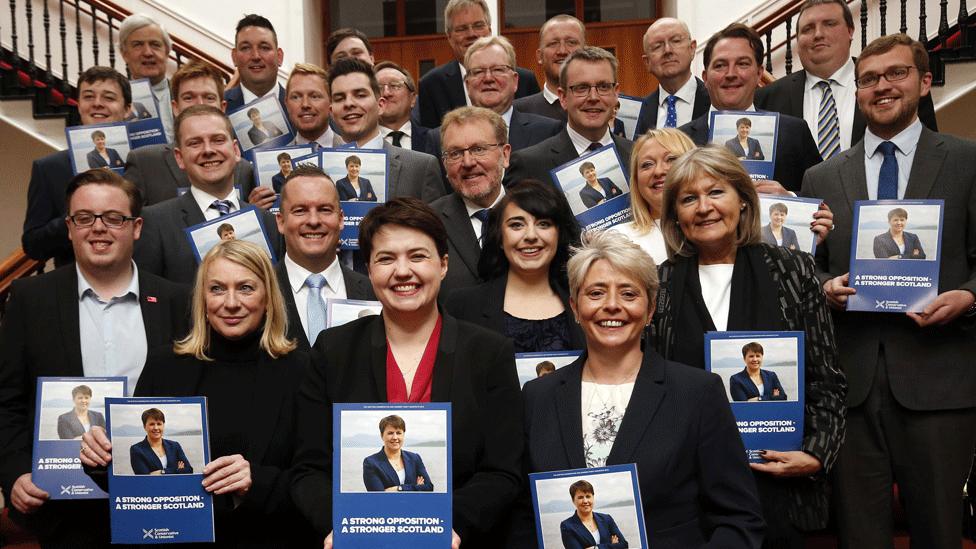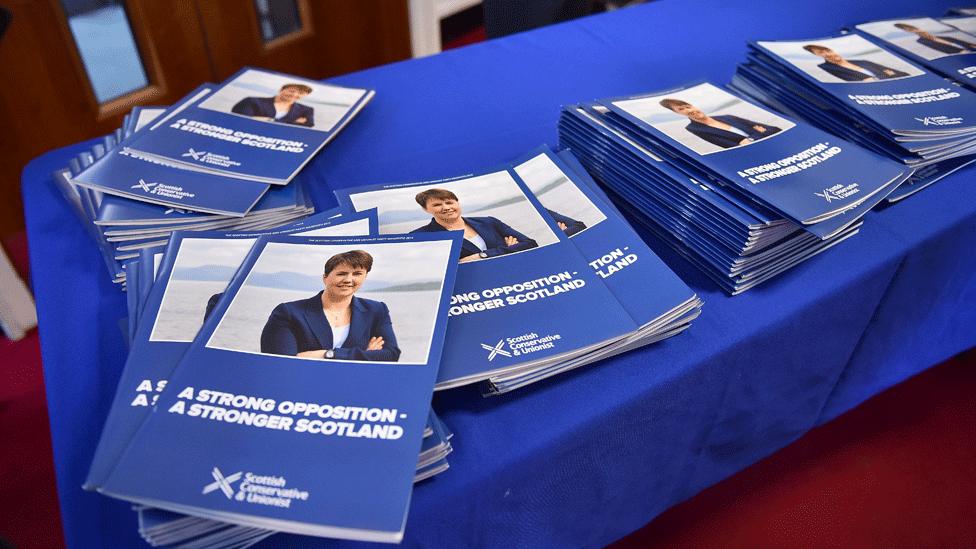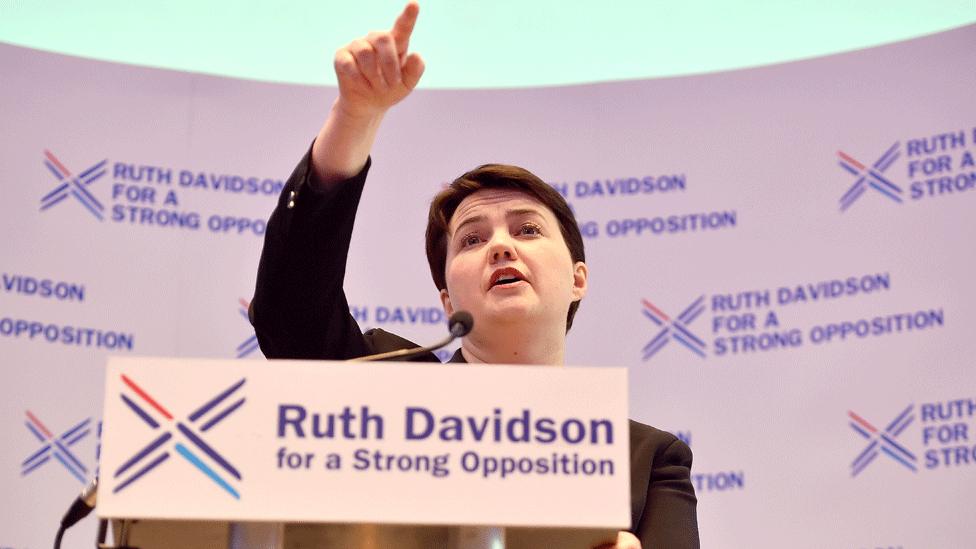Holyrood 2016: Scottish Tories prepare for (strong) opposition
- Published

Scottish Conservative leader Ruth Davidson with party candidates
It has become habitual, of late, to deride or downplay David Steel's famous exhortation to his party faithful. You remember the one: "Go back to your constituencies - and prepare for government!"
(Incidentally, I deploy the familiar "David". He is, of course, now Lord Steel although, while Presiding Officer at Holyrood, he charitably agreed to be called "just Sir David.")
No matter. Back to his speech as the erstwhile Boy David to the Liberal Assembly in 1981. The political chat at the time was of forging a new centrist Alliance, of breaking the mould of British politics.
Anyway, I well remember the speech - and its environment. I also remember that the appeal did not seem out of place at the time, in the hall, for that audience. In fact, it was electrifying.
It only attracted a degree of derision later when the political mould remained relatively intact.
Now, Ruth Davidson - who leads the Scottish Conservatives - is essaying a new version of the appeal. She is urging her team: "Go back to your constituencies - and regions - and prepare for Opposition!!"

The image of the Scottish Tory leader was clear to see on the party's Holyrood 2016 manifesto
It is, she readily concedes, rather different and distinctive. Mostly, she says, political leaders set out their stall with a presumption that they will sweep to power, lifted up by an adoring electorate. They laugh off suggestions of defeat.
Ms Davidson says she chooses "not to do that dance". The SNP, she says, are apparently "miles ahead in every poll you care to mention." They look like winning. Her offer is "to lead a strong opposition" to the Nationalist incumbents.
To do that, of course, requires supplanting the current lead opposition party, Labour. Ms Davidson's strategy for doing so is to deploy two issues where, she believes, there is substantial potential support.
One is taxation. She reckons that many Scots, particularly but by no means exclusively middle class and aspirational Scots, would rather not pay any more in taxation, if it's all the same with you.
They may talk about public services. They may nod in acquiescence when politicians preach redistribution. But, in the privacy of the ballot box, they may vote another way if given the option. That is Conservative calculation number one.
The second issue concerns the Union. Ms Davidson's Tories formed Better Together with Labour and the Liberal Democrats. In that combination, they won. They gained 55 per cent of the popular vote in the September 2014 referendum.
Now Ms Davidson hopes to corral a large proportion of the 55, to persuade them that her party offers the staunchest defence of that expressed position. To cajole them, in short, to be both Unionist - and Conservative.
In doing so, she partly disavows the Better Together approach. She says there must be no repeat of Project Fear - the name given privately by advocates of the Union to the strategy of disquieting voters about the proclaimed consequences of independence.

Ruth Davidson is hoping she is pointing her party in the right way
Rather, she says, it should be a positive depiction of the benefits of Union. Led by the Tories. Driven by the Tories. To be honest, she need not expect a repeat of Better Together. Both Labour and the Liberal Democrats are too wounded by the fall-out of working with the Tories.
As justification for this renewed campaign, Ms Davidson cites the declaration by Nicola Sturgeon that the SNP intend to revisit the issue of independence from the summer.
This is faintly specious - in that Ms Sturgeon's campaign is primarily designed to persuade her party that the detail of the independence offer, for example on the currency, must change. In that sense, it is initially internal, not external.
But, equally, Ms Davidson is justified in noting that the SNP are very far from abandoning their desire for independence. There is little talk now of this being a "once in a generation" question.
Given that, the Tories say there requires to be a revived campaign to protect the Union. And they argue that they are uniquely well placed to deliver same.
To some extent, therefore, Ms Davidson is summoning up an enemy that is not immediately present. There is no serious sign of an early rerun of the referendum.
Equally, however, she can justifiably argue that the threat, as she would describe it, remains extant - and, from a Unionist perspective, cannot be ignored. The EU referendum, for example, may change thinking, depending on outcome.
It's personal
As noted on this site previously, it is a transactional offer. Vote Tory at this election - and Ms Davidson will agree to stand up at Holyrood and oppose tax hikes and a second referendum.
She will also, she argues, offer a more credible Opposition than a Labour Party which she caricatures as broadly endorsing much of the SNP position. Incidentally, Labour returns this taunt upon the Tories.
Ruth Davidson's offer is, therefore, very much a personal pledge, predicated upon her own leadership. At the manifesto launch in Glasgow, there were scores of adoring supporters who gave her a standing ovation at beginning and end.
At the back of the hall sat - and stood - the wicked media. One member of same asked a good question. What happens if this personal pitch falls short? If both the SNP and Labour continue to outpoll the Tories? (The order was not specified.)
Understandably, Ms Davidson declined to pursue this avenue of speculation.